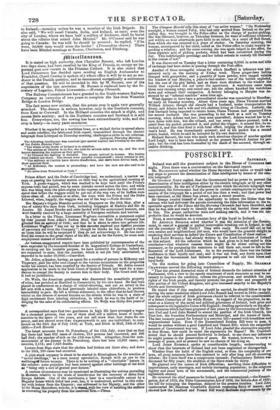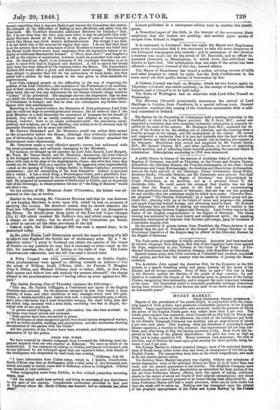POSTSCRIPT.
SATURDAY.
Ireland was still the prominent subject in the House of Commons bed night. First there was a conversation on the fabricated report. Mr. MACKINNON asked whether the Home Secretary had taken or would take any steps to prevent the dissemination of false intelligence by means of the elee- tric telegraph ? Si' GEORGE GREY replied, that the Government had no power to prevent the dissemination of false intelligence either by the electric telegraph or by any other
instrumentality. By the act of Parliament under which the electric telegraph was constituted, the Government had the power in certain contingencies to take pos- session of the telegraph fir a period of not less than a week; and that power had been exercised, as the House was aware, upon a recent occasion. Sir George availed himself of the opportunity to inform the House that the cabman who had delivered the parcels containing the false information to the re-
spectable agents of the Times and the Morning Chronicle had been identified, and that he was able and ready to identify the party who had banded those parcels to him. The proper authorities were now making search, and it was not fine probable that he would be detected.
Next, a conversation on a -counter-levy of the loyal in Ireland.
Sir ARTHUR BROOKE asked whether it was the intention of the Govern- ment, in case of a gene or partial insurrection breaking out in Ireland, to call out the yeonninry of -tree North ? They were ready. He could dill out On his own estates and neighbourhood 500 men, who would have the greatest delight In rendering their services to defend' the Crown and Constitution of these realms. Lord JOHN RUSSELL had already written to the Lord-Lieutenant of Ireland on this subject. All the reflection which he had given to it had ended in this
conclusion—that whatever reasons there might be for either calling out the.
yeomanry, or for postponing the summons to call them out, must be left to the discretion of the Lord-Lieutenant. As to the yeomanry, there was the fullest confidence in their loyalty and zeal; and it was not from any doubt upon that head that the Government had hitherto postponed to call out that brave and loyal body.
On the motion for going into Committee of Supply, Mr. Swamis CRAWFORD moved the following resolution- " That the present distracted state of Ireland demands the instant attention of Parliament., with a view to the speedy enactment of such measures as may be ne-
cessary to improve the condition, redress the grievances, and establish the just rights of the Irish people, and thereby promote the good order and prosperity of that portion of the United. Kingdom, and give increased security to her Majesty's Crown and Government."
He stated that if this resolution should be carried, he should follow it up by moving the same resolution which Lord John Russell had moved in 1844—namely, that the whole subject of Irish grievances should be referred to the consideration
of a Select Committee of the whole House. In support of his proposition, he en- tered on a history of the social and political grievances of Ireland, both prior and
subsequent to the legislative Union with England; dwelling particularly on the abor- tive measures which had been proposed of late years by the Governments of Sir Ro- bert Peel and Lord John Russell to amend the position of the Irish Church, the
Poor-law, the franchise Parliamentary and Municipal, and the tenure of lands. The last measure passed for Ireland is a coercion bill—passed with breathless and unprecedented haste. Even if the Encumbered Estates Bill were to pass, it would be useless without a good Landlord and Tenant Bill; which the suspended measure of Government was not. If Lord John pleaded the obstructive majority in that House, how could he resist the arguments for Repeal ? Mr. Crawford stated that he should proceed forthwith to Ireland, to use there any influence he might possess in the preservation of peace. He wanted, however, to carry a message of peace, and at present he saw no chance of his doing so. Lord Joule RUSSELL spoke at considerable length; endeavouring to show that the interests of Ireland had not been neglected or disregarded.
Whether from the habit of the English mind, or from the complexity of oar laws, all great measures have been assented to only after long and oft-recurring debates: the Union itself was a conspicuous instance; Parliamentary Reform was discussed for fifty years; the abolition of the Slave-trade for thirty. '
He glanced over the causes of Irish difficulties; ascribing those difficulties to improvidence, early marriages, and unduly-increasing population; to the religious bigotry and penal laws of the seventeenth, and the commercial jealousy of the eighteenth century. He reviewed the chief measures for Ireland, past or contemplated,—the Emanci- pation Act of 1829, the Tithe Commutation Act of 1838, the ReformAct of 1833; the bill for enlarging the franchise, delayed by the present troubles. Lord John controverted Mr. Sharman Crawford's doctrine respecting fixity of tenure; and showed how the Landlord and Tenant Bill would facilitate improvements by the tenant; regretting that it was not likely to get beyond the Committee this session. He enlarged on the difficulties of dealing at once effectively, and safely with the poor-laws. Mr. Crawford demanded additional Members for Ireland" Now, Sir, I do not deny that the time may come when it may be advisable that addi- tional Members should sit for Ireland, in the place of some of those boroughs which this House may think deserve disfranchisement. But though I say that, I do not think this is the moment for urging that topic. I do not find that there is at the present time that attendance of Irish Members to warrant the belief that the House would derive much more assistance from the legislative talents or in- dustry of additional Members for Ireland." (" Hear, hear, hear!" and laughter.) A bill on the subject of registration, however, would be proceeded with next ses- sion. He should not object to an extension of the municipal franchise, so as to make it equal with that in England and Scotland. A bill to amend the Grand Jury laws has been delayed by the business before the House. The Encumbered Estates Bill would effect a great and wholesome social change. Ministers had been obliged to abandon their bill for the reclamation of waste lands; but they added half a million for that purpose to the sum given to Irish landlords for improvements.
Lord John enlarged greatly on the difficulties in the way of improving the position of the Irish Churches,—the resistance of the Protestants to all modifica- tion of their church, with the claim of their antagonists for total abolition; on the other hand, the cry that any endowment for the Roman Catholic clergy would be e bribery " of the priesthood. His language conveys the impression that he does not think the Protestant Church excessive, as an establishment due to the million of Protestants in Ireland; and that he does not contemplate any further inter- ference with that establishment.
Recurring to the general subject, the discussion of Irish grievances, Lord John said he could not hope to preventprotracted debates; but he believed that if the Irish Members in a body demanded the enactment of measures for the benefit of Ireland, they would be as readily considered and adopted as any others. In Ireland, however, there is no single undisputed path: the grievances, social, political, and religious, are of long standing; and redress is to he obtained only by peaceable discussion, not by arms and rebellion.
Mr. HENRY HERBERT and Mr. MONSELL could not refuse their assent to the proposition before the House; although they evidently doubted the use of advancing it just now. Mr. FAGAN and Mr. ANSTEY attacked the Government more rancorously.
Mr. OSBORNE made a very effective speech; severe, but enlivened with his usual pleasantry, and seriously damaging to the Ministers.
For instance, be brought up old speeches by Lord John Russell, Lord Morpeth, Mr. Ward, Mr. Vernon Smith, and Mr. Macaulay, denouncing the Irish Church in the strongest terms, as the master grievance; and compared their present po- sition with that in the days of the Appropriation clause; also with that when they turned out Sir Robert Peel on a coercion bilk He suggested some improvethenne —such as the opening of Trinity College Dublin to Roman Catholics; systematic colonization; and the remodelling of the Irish Executive. Ireland is governed like a colony: it has a mock King, a Brummagem Court, and a pinchbeck Exe- cutive; it is really governed by the constantly changed Home Secretary in Eng- land. He proposed an occasional session of Parliament in Dublin, and an occasional visit of the Sovereign; in whose presence the star of " the King of Munster " would not shed a ray.
On the motion of Mr. MORGAN Jome O'CONNELL, the debate was ad- journed to this day at twelve.
Earlier in the evening, Mr. CHARLES BULLER said that he was desirous of not keeping Members in town upon bills which he had no prospect of carrying this session. He therefore stated, that he should abandon the Poor-law Officers' Superannuation Allowances Bill, not yet discussed in the House. He should, press those parts of the Poor-law Union Charges (No. 2) Bill which renewed Mr. Bodkin's Act, and which made vagrancy a charge on the union; but he should go into Committee pro forma, in order to cut out all the other provisions of the bill.
Late at night, the Union Charges Bill was read a second time; to be committed today,
In the • ether House, Lord BROUGHAM moved the second reading of a bill to import into England the Scotch law of declaratory suits. By a " de- claratory action" a party in Scotland can obtain the opinion of the Court of Session on any question he may find it necessary to raise—such as his title, his marriage, the right of fishing, or the right of way. The LORD CHANCELLOR concurred; and the bill was read a second time.



























 Previous page
Previous page